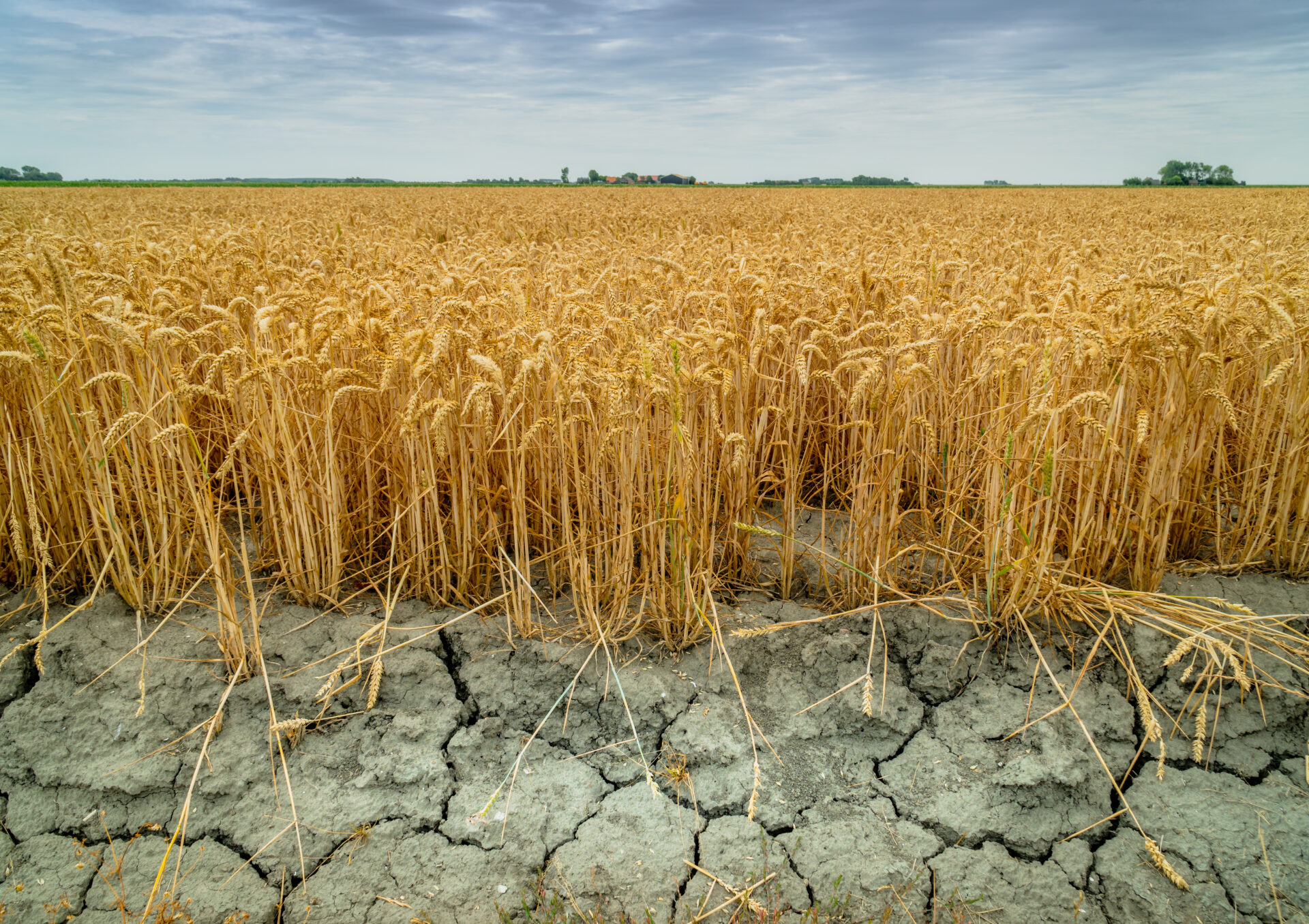Water for food security in a changing climate
How can we boost Sweden’s food security despite increasing climate risks? Join our seminar and learn how we can reduce water-use in food value chains and learn from good examples. Which ideas can we adapt to the Swedish context and scale up?
Ahead of World Water Day 2024, SIWI Swedish Water House, SIANI and SLU Global will arrange a half-day seminar to highlight the role of water in agriculture. The topic is timely as Swedish food producers and retailers face fast-growing water risks. The summer of 2023 was marked by both exceptional droughts and extreme rain events, causing harvests to drop by 30 percent.
Unfortunately, the situation looks set to worsen. Climate change already impacts the water cycle, making farming more and more difficult. This is aggravated by poor water management and practices that lead to degraded soils.
What is inspiring, however, is how much research and innovation have gone into reversing the trend. More resilient agricultural practices are starting to take root, not least in regions that have been affected by droughts or floods for a long time. There are already many on-the-ground approaches for water-smart farming in Sweden, as well as around the world, that we can learn from.
With this seminar, SIWI Swedish Water House, SIANI and SLU Global want to create interest in new ways of climate-proof agriculture. We are proud to welcome a wide range of knowledgeable experts and hope for many interesting discussions. Join us to learn more and share your perspectives.
Watch the recording
You need to activate cookies to see the video below, otherwise, watch it directly on Youtube.
Practical information
- Spoken language is English
- The event takes place in Hörsalen at Medelhavsmuseet on Fredsgatan 2 in Stockholm, and will be livestreamed and recorded.
- Free of charge
Onsite registration
- Registration for onsite participation closes 15 March (13:00 CET).
- In case of the need for cancellation – All cancellations must go through malin.wennerholm@siwi.org no later than 19 March.
Online registration
- Registration for online participation closes 20 March (13:00 CET).
- Online participants do not need to cancel if they can’t attend.
Program
Moderator: Mats Johansson, Expert water resources and water framework directive, WWF Sweden
- 12:30 Doors open and refreshments
- 13:00 Welcoming notes
- Thomas Rebermark, Director at Swedish Water House, SIWI & Moderator Mats Johansson
- Keynote speakers
- Jennie Barron, Professor at SLU (Swedish University of Agricultural Sciences)
- Nonette Royo, Executive Director at The Tenure Facility
- Panel discussion, moderated by Malin Lundberg Ingemarsson, Programme Manager at SIWI
- Katarina Wolf, President at LRF Ungdomen (The Federation of Swedish Farmers’ Youth section)
- Sajeevan Radha Sivarajan, Researcher at SLU
- Patrik Strömer, Policy expert on civil defence and food security at Livsmedelsföretagen (Swedish Food Federation)
- Case study presentations
- Video: Future-proofing food production by Spowdi
- Nicola Parfitt, Project Manager at Sanitation 360
- Break with snacks and refreshments
- Group discussions
- Closing remarks
- Anders Drottja, Political Advisor at the Swedish Minister for Rural Affairs
- 15:30- 16:00 Coffee mingle
Speakers
Anders Drottja is political advisor at the Minister for Rural Affairs, Peter Kullgren. Previously worked as a farm hand for 15 years. Have an university diploma in agricultural and rural management and have been working five years with environmentally-oriented advice, education in use of pesticides and handling agricultural support at the county administrative board. I have most recently worked for 15 years at the federation of Swedish famers, where I have had a whole range of different work areas.
Jennie Barron is a professor of agricultural water management at the Swedish University of Agricultural Sciences (SLU). Her research concerns water management in agriculture. Jennie’s particular interests include development and transformation of agro-ecosystems and landscapes, through water and land management, policy engagement and capacity building, with a focus on sub-Saharan Africa and Asia.
Katarina Wolf is the President of LRF Ungdomen, the organization for young Swedish farmers. Apart from that she runs a dairy farm in the south of Sweden together with her two older brothers. They took over the farm together in 2018.
Malin Lundberg Ingemarsson is Programme Manager and Team Lead Water for Resilient Landscapes at SIWI Swedish Water House. She joined SIWI in 2019, leading the working on the links between water, landscapes, biodiversity and climate change. Malin has experience of working with forests, nature resource management, biodiversity and agroforestry with the Agroforestry Network, Focali and FAO in Rome, Italy. She has field experience from lowland rainforest in Borneo, savannas of Southern and Eastern Africa and Swedish boreal landscapes.
Mats Johansson is an expert on water resources and the water framework directive at WWF Sweden. Mats is a systems ecologist focusing on water resources, agriculture and change and also has a special interest in sustainable sanitation. He has for more than 25 years worked as a consultant with R&D-projects, policy development and is now leading the programme Baltic Stewardship Initiative at WWF.
Nicola Parfitt is a master’s graduate from Lund University, Sweden, where she studied Environmental Studies and Sustainability Science. She wrote her thesis on “Centering Farmer Perspectives on a Dry-Fertiliser Made from Human Urine”, in collaboration with Sanitation360 – a Swedish company that recycles human urine and turns it into a solid fertilizer for agricultural use. She now works as Sanitation360’s project manager/generalist with the goal to help Sweden, and the rest of the world, transition towards a circular nutrient economy.
Nonette Royo has spent more than 30 years fighting for the tenure rights of indigenous communities in the world’s principal tropical forest regions. As executive director of Tenure Facility since its founding in 2017, she has worked alongside Indigenous Peoples and local communities to strengthen their tenure and ability to preserve, protect and enjoy the benefits of their traditional lands and resources. A lawyer, she co-founded and led the Samdhana Institute and set up several non-governmental organisations focusing on advancing Indigenous Peoples and women’s legal rights.
Patrik Strömer is Policy expert on civil defence and food security at Livsmedelsföretagen (Swedish Food Federation). Patrik has worked with different aspects of food security the last eight years. He was also advisor in the latest governmental committee on food security in Sweden. He has studies in history and philosophy and once Swedish grandmaster in Jeopardy!
Sajeevan Radha Sivarajan is a researcher in the Resistance Biology Group at the Department of Plant Protection Biology, SLU Alnarp. His research interest is understanding the mechanisms behind plants’ abiotic and biotic stress responses and their biotechnological improvement for better survival and productivity. This includes, among other things, tolerance to drought and heat stress.
Thomas Rebermark is Director of Swedish Water House at SIWI. He focuses on bringing science, policy and practitioners together to empower cross sector collaborations and influence international policy on sustainable water governance. Thomas’ previous affiliations include WaterAid, Childfund Sweden and International, and private sector organisations within urban development, infrastructure, and civil engineering. He sits on the Election Board of UN Global Compact Network Sweden and is a Board Member of IWA Sweden.





